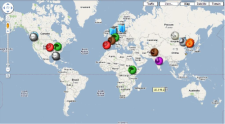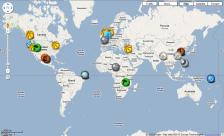Again my profound thanks to the indefatiguable Charles A. Tan for interviewing all the SHINE authors. Well, all the SHINE authors? Charles missed one, possibly becuase he’s so close to him (relatively speaking: they both post on the World SF News Blog, but live a considerable distance from each other).
I thought about attenting Charles to this (and I will now), but on second thought decided to interview Lavie myself.
So here is the ‘lost’ SHINE interview with Lavie Tidhar (and as an extra bonus tomorrow I will post the podcast of Lavie’s SHINE story The Solnet Ascendancy, narrated, very vividly, by Ray Sizemore):
Jetse de Vries: Actually, I don’t really see you as an ‘optimistic’ writer (at least: the work that I’m aware of). So why try SHINE? Stretch your wings? The challenge? Or do you just want to be published in every publication available?
Lavie Tidhar: It’s interesting — how do you fit into an ‘optimist?’ label? I’m not sure I’d describe myself that way, but with my science fiction work — I’ve been working on my own sort of future-history in a sequence of short stories and at least one novel — and that assumption, that there is a future, that humanity goes on to the solar system and even out of it, that it develops the tools necessary for its own survival — that’s quite optimistic, isn’t it?
I’m not sure the stories themselves are particularly optimistic — which comes down to an awareness that, even if we do go out into space, even if we do develop alternative energy sources and so on — humanity will still remain the same. You’d still have abuse (of people, of power), greed, violence… which means you can still tell interesting stories. I don’t ever see a utopia emerging, but I also doubt we’ll destroy ourselves in the short term.
So — a realist? But I’m pretty sure realists don’t write science fiction…
Maybe the answer is just wanting to be in every publication going, as you suggested!
Jetse de Vries: You’re an avid traveller, and it informs your writing. Did your awareness of the wider world eventually initiate the World SF Blog?
Lavie Tidhar: Yes and no. I always knew I wasn’t a part of the American SF sphere, in a way. I grew up on a lot of American SF, but I also grew up on a lot of very obscure Hebrew fantastical fiction (not to mention growing up on a kibbutz, which is a real-world failed-utopian construct), so my interest, very early on, was in different modalities of science fiction and fantasy. You know, James Gunn can bleat all he wants about how science fiction is soooo American, but it’s not: it’s a way of thinking about the future that, one could argue, needs very little in common with the American pulps. So whenever I went travelling I always looked for that. I remember at eighteen — I wasn’t even eighteen then — travelling through Eastern Europe just post-communism, and picking up the Romanian Nemira anthologies, and some interesting Russian books in translation — and going to China a few years later was a delight, because I got to meet all these science fiction writers in Beijing. Most recently I went to Singapore and had a chance to meet a lot of people working in the field at the moment.
I’m very lucky I’ve been able to move around as much as I have, but then you also sacrifice a lot for it, I guess — a sort of stability is obviously lacking.
The blog was something I wanted to try for a very long time, but it was the publication of The Apex Book of World SF that finally enabled me to do that — it was meant to be a promotional tool for the anthology but, of course, very quickly took on a life of its own. And it’s been pretty incredible — all these talented people joining us, contributing articles, starting a real dialogue that’s still ongoing, that’s still evolving.
Jetse de Vries: When writers write about an ‘exotic’ place on today’s Earth, must they really have been there, or can they get away with making it up and a ton of research? Or in other words: does one need to have been in an exotic locale to write about it?
Lavie Tidhar: You know, as I’ve said before, what’s exotic for one person is commonplace to another. So if you approach a location as “exotic” you’ve already lost, in a way. I don’t personally know if writers need to have visited somewhere or not. Personally, I need to. I need to get a sense of place or I find it very hard to write about it. Which is why I almost never write anything set in the United States. For me, I need to learn a place slowly, over time, and even then I know I’m only scratching the surface. So part of it is pretending, obviously! But not too much, I hope.
Jetse de Vries: Why do editing projects at all, when you’re already writing? Basically, editing (anthologies, books, magazines) is a huge time sink (believe me: I know), so why bother?
Lavie Tidhar: You’re right. I don’t really have an answer to that — it can be incredibly frustrating and time consuming and so on, but at the same time it can be incredibly satisfying. I love the fact I get to promote other people’s work, put together something I can be proud of. As long as it doesn’t take over fiction writing, for me (or playing with comics or whatever I end up being fascinated with) then it’s ok. I think it’s a bit like a bug — once you get it, it’s very hard to stop!
Jetse de Vries: In “The Solnet Ascendancy” you depict Mike Rowe as a well-intended volunteer, while the Vanuatu local in the story — Fatfat Freddy — in the last part of the story wistfully remarks: ‘“Fifty years of volunteerism—” he makes it sound like a rare type of disease, “and what did it get us?”.’ How ambiguous do you feel about volunteer labour in developed countries?
Lavie Tidhar: Sadly, I didn’t invent “volunteerism”. It’s an actual term used by development agencies. The fact that it sounds like a disease — and they don’t seem to get it — is quite sad, isn’t it? I know a lot of people in development, and I know a lot of them do feel ambivalent about it. How much good does it do? How much bad? How much of it is tied in with national or big-business interests, or with a very specific vision of what development means? It’s not things I can answer easily.
Jetse de Vries: When I spoke with John Berlyne at the last EasterCon, he was full of praise for your novel Osama (to be released by PS Publishing). An excerpt from it has gone up online recently on World Literature Today’s special SF issue (If I understand correctly). However, while John loved Osama, he also mentioned it was a near-impossible sell to the ‘big’ publishers. Do you intentionally try to write controversial material, or did it just happen? And do you think that something like — say — Salman Rushdie’s The Satanic Verses would be published today by a major publisher?
Lavie Tidhar: What’s published in World Literature Today isn’t actually a part of the novel. It’s a story about a guy who wakes up one morning to find out he’s Osama bin Laden. I write a lot about politics, I think. The novel, Osama, actually owes part of its origin to a story I wrote a while back, My Travels with Al-Qaeda (in Ellen Datlow and Terri Windling’s anthology Salon Fantastique), which is sort of a love story, about two people trapped by several bombing attacks — which is sort of what happened to my wife and me. We were in Dar-es-Salaam when the American embassy was bombed, my wife was in the Sinai during the Ras-al-Saitan bombinbgs, in London during the Kings’ Cross bombings… so you do get to the point where you think, hey, is this personal?
Osama is, I think, a very ambitious novel. And I do think that, at heart, it’s a love story. What John said is absolutely true. A lot of editors liked the book, but were afraid to publish it. And we’re very lucky Nick Gevers and Pete and Nicky Crowther at PS were so enthusiastic about it.
Now, I don’t set out to write ‘controversial’ material. But I do feel I should engage with what’s important, that I should write about things that matter. It’s not to say I don’t love the escapist stuff as well, but at heart I’m a political writer — because there’s so much that we need to talk about, need to understand.
Would The Satanic Verses be published today? I have no idea. So far, however, Osama has been turned down by, oh, well, a fair number of publishers, yes. But I’m lucky to have PS, and I am still hopeful someone would get over this fear and pick it up. We’ll see…
Jetse de Vries: Do you think science fiction (or any other writing) is capable of changing the world?
Lavie Tidhar: Well, everything we do changes the world, doesn’t it? It’s a question of scale, not effect. But yes, absolutely it does. Books have a tremendous power. And even it all it ever does is help someone pass a lonely night, well, that’s still changing the world to the better, isn’t it?
Jetse de Vries: Does being an Israeli inform your writing in any specific matter?
Lavie Tidhar: Obviously it does, though being also a naturalised South African and having permanent right-to-remain in the UK makes me feel like Uri Geller, sometimes… I find Israel fascinating, as an experiment in large-scale myth-making — it has an entire history written and patched-together to justify it. In a very real way it was, and is, an experiment in creating a fictional state. You’d have to be crazy, as a writer, not to want to engage with it.
Jetse de Vries: Finally, anything you want to plug (apart from The Apex Book of World SF and the World SF News Blog)?
Lavie Tidhar: I’d like to give a shout-out to Shine, an anthology of optimistic SF stories!
Truth is, I’ve got a ton of stuff coming out. The Bookman, my novel from Angry Robot Books, comes out in the US in October — it’s kind of a love letter to steampunk. And another novel in the same world, Camera Obscura, is coming out next year. Can you say kung fu-noir?
There’s also Martian Sands, a short novel coming out from Apex Books in the US — late this year or early next year, I’m not sure — which deals with the holocaust, kibbutzim on Mars, fictional detectives, digital intelligence and evolution, drugs, four-armed Martian warriors and, well, lots more. I think of it as Schindler’s List meets Total Recall.
Osama, as we mentioned, is coming out of PS Publishing in the UK, in a limited hardcover edition. This is probably next year sometime?
PS are also releasing my novella Cloud Permutations soon, which is about Melanesian colonists on a distant planet, a boy who wants to fly, possibly sentient clouds and a quest. You got to have a quest! And PS will release another novella from me at some point, Gorel & The Pot-Bellied God, which I think of as a guns & sorcery novella — think sex, drugs and violence, with no redeeming features!
And Apex Books are re-issuing my novella, An Occupation of Angels, very soon — a supernatural cold war thriller with angels. And there are quite a few short stories coming up — from Interzone to Ellen Datlow’s anthology Naked City.
Keeps me busy…
[End of Interview]
Anyway, with the excerpt of his story posted yesterday here on the SHINE blog, and an interview with him today, and a podcast of his story tomorrow, we might as well call it Lavie Tidhar week.
















Pingback: Tweets that mention The ‘Lost’ SHINE Interview: Lavie Tidhar « DayBreak Magazine -- Topsy.com
Pingback: SHINE Podcast: “The Solnet Ascendancy” « DayBreak Magazine